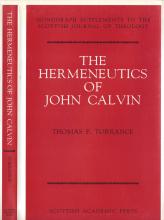Thomas F. Torrance, The Hermeneutics of John Calvin, Monograph Supplements to Scottish Journal of Theology, ed. A. I. C. Heron and Iain R. Torrance (Edinburgh: Scottish Academic Press, 1988); #1988-488
Torrance, Thomas F. The Hermeneutics of John Calvin. Monograph Supplements to Scottish Journal of Theology, edited by A. I. C. Heron and Iain R. Torrance. Edinburgh: Scottish Academic Press, 1988; #1988-488
This is one of five works Torrance conceived as a sequence on the history of hermeneutics. In the Prefaces to Divine Meaning (#1995-588) and The Hermeneutics of John Calvin (#1988-488), Torrance explains that he had originally projected a three-volume work on the hermeneutics of the Fathers, of Calvin, and of the Moderns. Divine Meaning (#1995-588) and The Hermeneutics of John Calvin (#1988-488) comprise the first two volumes of the trilogy, respectively. The third volume on the hermeneutics of the moderns was realized in a sub-trilogy of works: Space, Time and Incarnation (#1969-262); Space, Time and Resurrection (#1976-331), and Reality and Evangelical Theology (#1982-397). Torrance's intent with the larger trilogy was to focus on "the history of hermeneutical thought in which particular attention was devoted to the epistemological issues involved" (Divine Meaning Preface, p. 1). Regarding the "moderns" trilogy within a trilogy, Torrance explains (Calvin Preface, p. vii): "Some of the main problems that have arisen in modern hermeneutics have been discussed in" them.
He continues that the "essence of what I have set out here about Calvin's epistemology was presented in a lecture entitled 'Knowledge of God and Speech about him according to John Calvin,'... published in Theology in Reconstruction" (#1965-223f), and in France (in English) in Revue d'Histoire et de Philosophie Religieuses (#1964-214).
Although this volume was published as a monograph supplement to the Scottish Journal of Theology, it is not numbered like the other volumes (#1972-TFT-1).
Dedicated "To Robert Torrance Walker, Theologian and Scholar, In Admiration and Encouragement."
Preface, p. vii-ix.
Part I: The Parisian Background to Calvin's Thought.
John Duns Scotus, p. 3.
Abstractive and Intuitive Knowledge
Being as the prime object of understanding
The Knowledge of God:
perfect and imperfect intuition
voluntary and natural object
different levels of knowledge
William of Occam, p. 12.
Abstractive and Intuitive Knowledge
Signification:
rejection of images in the middle
primary and secondary intention
theological knowledge
Impact on hermeneutics
John Major of Haddington, p. 23.
(1) Notitia
(2) Dialectica
(3) Theologia
(4) Interpretatio
Part II: The Shaping of Calvin's Mind
The Early Writings
Calvin's theological and hermeneutical method, p. 61.
Influences at work in Calvin's Thought.
(A) Late Mediaeval Thought and Piety, p. 72.
(i) The devotio moderna
(ii) The Impact of the Collège de Montaigu
a. scientia practica
b. notitia intuitiva
as knowledge according to nature
as personal knowledge
as auditive knowledge
c. The nature of theological statements
d. The interpretation of Scripture
(B) Sixteenth century thought and scholarship, p. 96.
a. The effect of Calvin's legal and humanist studies
(i) the relation of language to logic
(ii) the relation of language to practical life
(iii) the relation of language to Scripture
b. The impact of the new empiricism
the importance of inventio in scientific inquiry
L. Valla: In dialecticen
R. Agricola: De inventione
c. The impact of classical and biblical studies at the Collège Royal
The influence of Desiderius Erasmus
(i) The De Clementia
(ii) The De Scandalis
d. Calvin's indebtedness to Martin Luther
Epilogue, p. 161.
Notes, p. 167.
- PTS copy.
- Oklahoma History of Science Collections copy donated by James B. Walker.
- Log in to post comments
- 513 views

